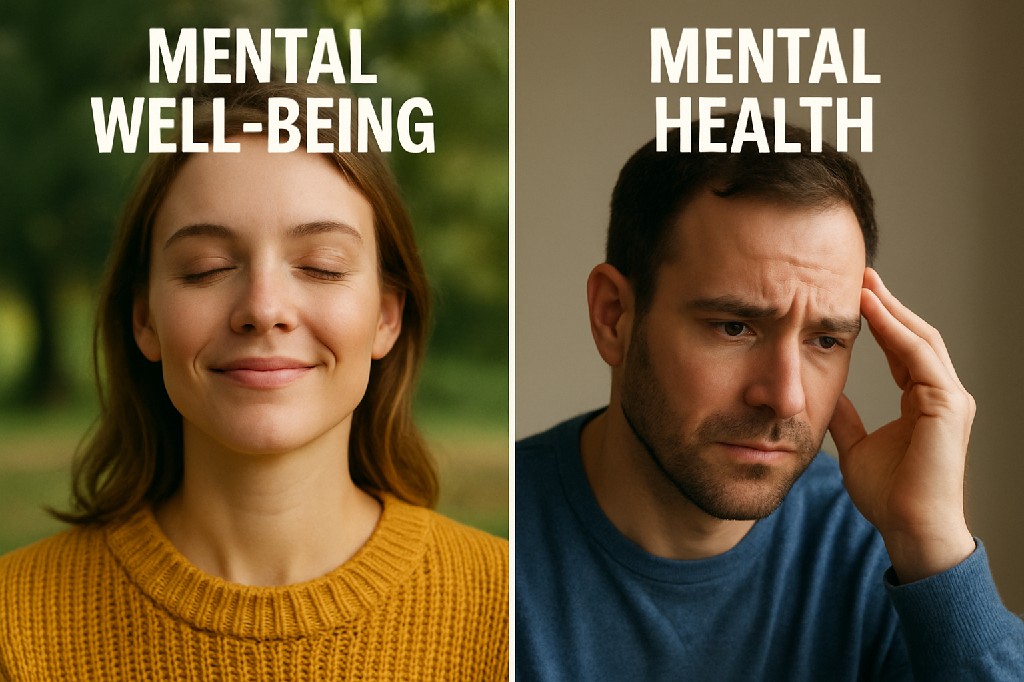Mental Wellbeing vs Mental Health: What’s the Difference?
Mental Well-Being vs Mental Health: The Key Differences
When we talk about the mind, mental well-being vs mental health are terms often used interchangeably. However, they are not the same. Understanding the distinction between the two is crucial for fostering a balanced and fulfilling life. While mental health focuses more on the absence or presence of mental illness, mental well-being encompasses a broader concept that includes emotional, psychological, and social aspects of life.

Mental Well-Being vs Mental Health: Why It Matters
In recent years, the conversation about mental well-being vs mental health has become more mainstream. Yet, many still confuse the two. Mental health refers to the state of our mind, including our emotional, psychological, and social functioning. It determines how we handle stress, relate to others, and make choices.
On the other hand, mental well-being is about how we feel about our lives, our ability to enjoy life, and our sense of purpose. In other words, someone may have a diagnosed mental health condition but still experience a high level of well-being through effective coping strategies and support systems.
The Definition of Mental Health
To understand mental well-being vs mental health, we first need to define each clearly. Mental health is the ability to manage emotions, think clearly, and maintain relationships. It is largely shaped by factors like biology, life experiences, and family history of mental illness.
Although good mental health doesn’t mean you’re always happy or stress-free, it does imply that you can function in daily life and bounce back from adversity. Mental health issues can include anxiety disorders, depression, bipolar disorder, and schizophrenia.
What Is Mental Well-Being?
Conversely, mental well-being is the positive side of the mental spectrum. It involves self-acceptance, personal growth, autonomy, and purpose in life. While mental health may fluctuate due to external events, mental well-being is more about cultivating habits and attitudes that promote inner peace and resilience.
In fact, people who actively nurture their mental well-being, through meditation, strong relationships, or a healthy lifestyle, are more equipped to manage stress and life’s challenges. Therefore, focusing on well-being isn’t just preventative; it’s essential for thriving.
Mental Well-Being vs Mental Health in Practice
To clarify further, imagine two individuals. One is diagnosed with mild depression but engages in regular therapy, exercises, and has a strong support network. The other has no diagnosis but leads a stressful, unfulfilled life with poor sleep, bad diet, and no social connections.
Surprisingly, the first person may report a better quality of life due to their mental well-being vs mental health balance. This example highlights how mental health is not the only factor that determines our happiness or satisfaction.
How to Improve Your Mental Health
Even if you struggle with mental illness, there are ways to enhance your mental health:
-
Seek professional help when needed
-
Build a strong support system
-
Practice mindfulness and stress-reduction techniques
-
Get regular physical activity
-
Maintain a healthy diet
Moreover, early intervention can make a significant difference. If symptoms of anxiety, depression, or other conditions appear, don’t hesitate to talk to a doctor or therapist.
Boosting Your Mental Well-Being Daily
In contrast to treating disorders, improving mental well-being is about adopting daily habits that build emotional strength. Here are some strategies:
-
Gratitude journaling: Helps shift focus from problems to positives
-
Volunteering: Enhances sense of purpose
-
Creative hobbies: Stimulate joy and reduce stress
-
Spending time in nature: Boosts mood and energy
-
Limiting screen time: Reduces comparison and anxiety
These actions not only support your mood but also enhance your long-term psychological resilience.
Final Thoughts on Mental Well-Being vs Mental Health
To summarize, mental well-being vs mental health is a distinction worth understanding. While mental health is essential for functioning, mental well-being is crucial for flourishing. Both are interconnected, but not dependent on one another.
Taking care of your mental health means addressing problems when they arise. On the other hand, nurturing your mental well-being means proactively building a life that feels meaningful and satisfying.
“Mental health is not a destination, but a process. It’s about how you drive, not where you’re going.” – Noam Shpancer
